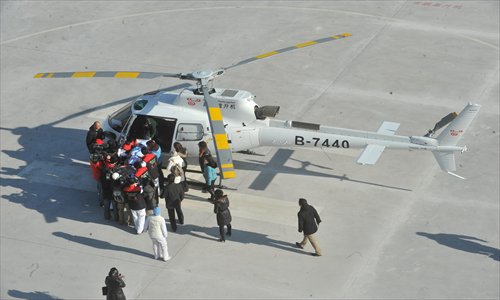New air rescue only for the rich

A year after the Beijing Red Cross announced its new emergency air rescue service, it has only been used twice, by a foreigner and a patient covered by a foreign insurance policy.
The service is out of reach to most Chinese. Even in life-threatening situations, people must pay upfront to use the service.
"Now the air emergency rescue services can cost over 100,000 yuan ($16,000) a trip, which is too expensive for most people," Li Chongsen, the spokesman of Beijing Red Cross, told the Global Times.
To make the service more accessible as it enters its second year, the Beijing Red Cross is negotiating with insurance companies to launch air rescue insurance next year, said Li.
Li said that the exact fee for the insurance has not been set. The Beijing Daily reported the new fee is expected to be under 1,000 yuan a year.
Li Tao, the spokesman of Beijing Red Cross Emergency Rescue Center (999), which operates the air rescue, told the Global Times that since they started their airline emergency services at the beginning of this year, two people used the service.
"It's not a public service. It's for rich people. Not everybody can use this," said Zhou Zijun, a public health expert at the Peking University.
When a patient phones 999, the center will contact with the airline companies first and to apply for a flight.
"The application process often takes one or two days. The airline companies also need to check the landing situation of that place," said Li.
During the same time, the emergency center will send doctors to the patients to see whether their condition is suitable for the air transportation.
"So far, we haven't provided air transfer services for the patients in so serious condition that they are about to die," Li said, pointing out the two patients they transferred were because they wanted better treatment at Beijing hospitals.
On January 2, a Swedish boy slipped when skiing and ruptured his spleen in Zhangjiakou, Hebei Province. The Red Cross' 999 emergency center transferred him to a Beijing hospital which cost around 100,000 yuan.
On February 17, the emergency center used a helicopter to pick a 13-month-old child suffering from encephalitis. The child had American insurance and the transfer fees were paid by a foreign company, the Beijing Youth Daily reported.
Li said they sent doctors, nurses and medical treatment apparatus to go with the helicopters to fetch the patients.
"The money needs to be paid in advance to the airline companies," noted Li.
Li said that the helicopters will land in the Red Cross Hospital on the north Fifth Ring Road first, and be transferred to other hospitals by ambulance.
Ahead of the launch of the air rescue program, during its trial in 2011, the vice chairman of the Beijing Red Cross Han Lu said, "The number of the jets is limited and mainly deal with rescue in big and sudden accidents. It cannot serve all the people in need of the air emergency services. But it paves the road," according to a Beijing Times report.
Zhou said that the Red Cross' attempt to get their service covered by insurance is a good beginning.
He said that the long delay between the request for service and the actual flight should be shortened.
According to the website of Xinhua News Agency on July 29, 2012, the medical insurances now covers more than 1.25 billion people, forming the world's largest medical ensure system.
Patients in a life-threatening emergency cannot be turned away by Chinese hospitals even if they have no money to pay.
However, patients seeking premium treatments will often be burdened with significant bills that the policies do not cover.